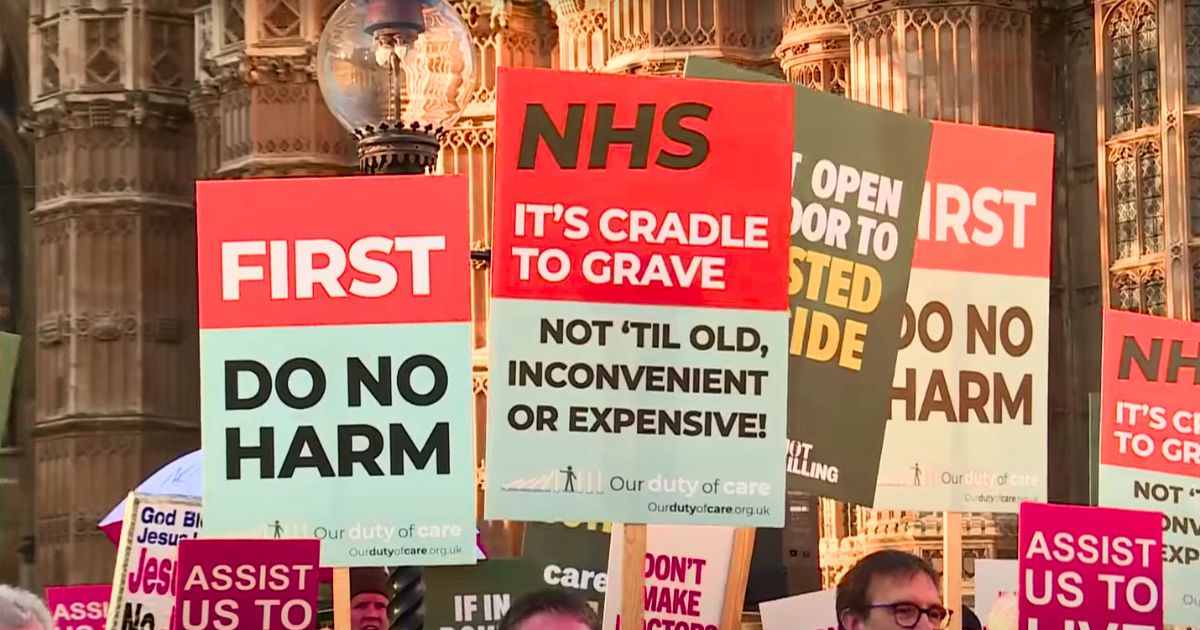Hundreds of people could end their lives by assisted suicide in its first year of implementation, rising to as high as over 4,500 annual deaths after ten years, which could save the state as much as £59 million by year ten, according to a government impact assessment.
The long-awaited impact assessment, released just after 4pm on Friday before the bank holiday weekend, estimates that as many as 4,559 people could end their lives by assisted suicide after ten years of implementation. This would equate to 12 people per day ending their lives by state-assisted suicide.
Shortly before the vote at Second Reading, the sponsor of the assisted suicide Bill, Kim Leadbeater, told the BBC that evidence from around the world shows that deaths by assisted suicide could be as high as 3% of all deaths. If such a figure were seen in England and Wales, there could be over 17,000 deaths by assisted suicide based on the total deaths for England and Wales for 2023.
The impact assessment also estimates that by Year 10, following the implementation of state-assisted suicide, the state in England and Wales could save as much as £59 million per year in palliative and end-of-life care costs. This is calculated by assuming a person seeking assisted suicide has six months to live, and assuming the process of assisted suicide takes up to two months, which would then leave “up to four months of unutilised palliative and end-of-life care”.
The assessment also estimates that the cost of the Voluntary Assisted Dying Commissioner, and their office, which was introduced in an attempt to replace the ditched flagship High Court safeguard, “would be approximately £10m per year”.
The estimated cost of staff time in delivering assisted suicide by year ten could be as high as £11.5 million per year, while the impact assessment assumes “that at least 6 members of health and social care staff [would be] typically required for a total of 32 hours” for every person who goes through the entire assisted suicide process.
A “good day to bury bad news”
The impact assessment was released just two weeks before Report Stage of the Terminally Ill Adults (End of Life) Bill, despite MPs complaining about the lack of such an assessment for the last six months.
Labour MP Meg Hillier, as well as several commentators, have been highly critical of the release of the impact assessment just before the bank holiday weekend and in the aftermath of the local elections. Hillier, who voted against the Bill, said “Releasing this long-delayed impact assessment while MPs are focused on local election counts far from Westminster and only weeks before the Bill comes back to parliament is another example of the failure of this process to live up to the promises made to MPs at second reading”.
“This is a weighty piece of legislation, with significant changes from Second Reading, such as the removal of the High Court judge. It’s essential that MPs have a real opportunity for proper scrutiny and improvement to do justice to a Bill of such consequence and to all those potentially impacted by it”.
Journalist Dan Hitchens commented that it was an “amazing coincidence that the impact assessment – initially scheduled for [the week commencing] April 7 – could only be published on the exact day when it’s least likely to make headlines”.
Prospect magazine suggested that the timing of the release of the impact assessment for the assisted suicide Bill was a “good day to bury bad news”.
“Not possible” to estimate
Despite the release of the impact assessment, there remains significant uncertainty about the cost of implementing assisted suicide because, as the assessment makes clear, there are so many unknowns that an accurate estimate is “not possible”. According to the impact assessment, this uncertainty arises from the fact that the “details about how it would work are to be set through secondary legislation” and through “regulations”.
At the opening of the 149-page document, the government states that “there are significant aspects of the Bill that have not been possible to quantify”.
The assessment also states that the details of how the Bill will be implemented, if it becomes law, “are to be set through secondary legislation. It is therefore not possible to robustly estimate” the costs of this legislation.
There remains uncertainty about the use of “approved substances” – lethal drugs that will be used in assisted suicide if it becomes legal – because the “provision about dispensing, transporting, storing, handling and disposing” of these substances is “to be set out in future regulations”.
Furthermore, the impact of this legislation on relatives and friends has “not been quantified” because the Secretary of State will only be making regulations on this at some future point.
Hannah Barnes, in the New Statesman, has been highly critical of the impact assessment on precisely these grounds, going so far as to call it a “guesstimate”.
“The detail is simply not there”, she writes. “What we have is numbers and costs – lots of figures, but imprecise, and with enormous ranges”.
Equality impact assessment
In addition to the impact assessment, the Department of Health and Social Care and Ministry of Justice also released an ‘equality impact assessment‘ that addresses, among other issues, “[p]otential barriers for disabled people in accessing” assisted suicide.
The equality impact assessment states that “[p]ersons with learning disabilities or deaf persons are examples of disabled people who may struggle to understand the information provided to them” and that “service providers are under an explicit statutory duty to make reasonable adjustments for disabled people and to provide information in an accessible format”.
Journalist Sonia Sodha was highly critical of the equality impact assessment, saying that it “focuses on the ability of people to *access* assisted dying. Not at the impact on vulnerable groups more likely to suffer wrongful deaths. Unbelievable given the parliamentary debate. It’s completely unfit for purpose”.
Spokesperson for Right To Life UK, Catherine Robinson, said “This kind of cost/benefit analysis is extremely dangerous and only heightens concerns for some of the most vulnerable people in our society. When such significant savings are involved, it can quickly become only too tempting to suggest assisted suicide when one might not have otherwise, or put subtle pressure on someone to end their life prematurely to save money. It could easily become a recipe for coercion”.
“Furthermore, the timing of the release of the impact assessment just two weeks ahead of Report Stage, just before a bank holiday weekend and in the midst of an extremely busy news cycle is, at the very least, highly suspicious. The enormous range of potential costs/savings based on unknown data arising from a poorly drafted Bill makes this impact assessment decidedly unserious”.
“Hopefully MPs will recognise these problems, many of which arise from a poorly drafted Bill, and vote against it at Third Reading”.












